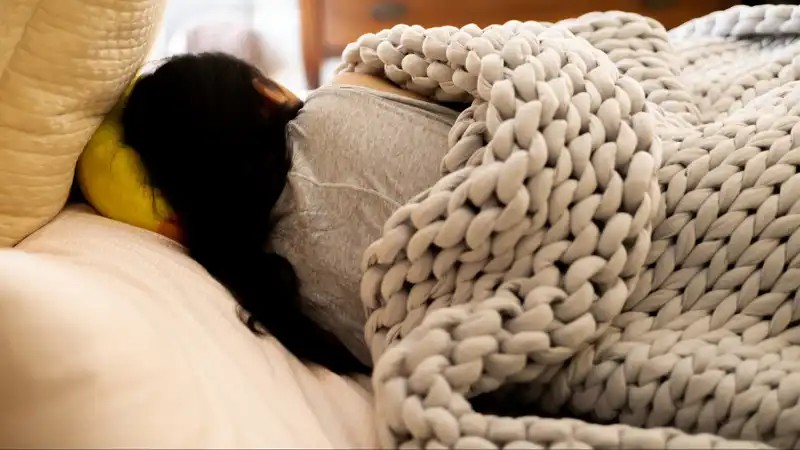A new review paper on the effects of weighted blankets by researchers at Flinders University was recently published in the American Journal of Occupational Therapy. According to the paper, weighted blankets have been scientifically proven to improve mood and mental state and help people with insomnia fall asleep and stay asleep.
Weighted blankets usually have small pockets of micro glass beads sewn into them, giving them a sense of weight. This creates a pressure therapy similar to the sensation of being hugged. As a result, the nervous system relaxes, easing nighttime anxiety and stress, while simultaneously preparing the body for sleep.
So, I'm going to explore this research further and find out exactly how weighted blankets can help insomniacs, as well as tips and home remedies for relieving insomnia symptoms.
According to a 2024 survey by the American Academy of Sleep Medicine, approximately 12% of American adults suffer from chronic insomnia. Simply defined, it is a condition in which a person has difficulty falling asleep and staying asleep despite adequate time and environment, resulting in constant waking.
Common symptoms of insomnia include extreme daytime fatigue, irritability, anxiety, inability to concentrate on daily tasks, and overall low mood and energy levels.
When these conditions occur three or more times in a week and last up to a month, the condition is classified as acute insomnia; when it lasts longer than three months, it is classified as chronic insomnia.
This study reviewed 18 existing research articles that investigated the use of overnight weighted blankets according to PRISMA guidelines. Materials were obtained from sources such as Medline, Cochrane Library, PsycInfo, Scopus, and Google and analyzed using standardized tools.
According to Dr. Suzanne Dawson, who led the team, weighted blankets were found to be a “visible non-drug intervention” that promoted quality sleep. Dr. Dawson said, “Adults who used the blankets reported better sleep, decreased use of sleeping pills, and even improved mood and pain management.”
By relaxing the nervous system and easing issues such as anxiety and stress at night, the mind and body are properly prepared for sleep.
It should be noted, however, that with children and adolescents, especially those with conditions such as ADHD and autism spectrum disorders, the results have been mixed and there is scant evidence that their sleep has improved.
It is always important to consult a physician or health professional if insomnia symptoms persist and affect daily life. However, here are some home remedies that can help you fall asleep and stay asleep.
Keeping a regular schedule is very important to regulate and maintain a healthy circadian rhythm (the body's internal clock that aids in daily physical and mental functioning). Try to wake up and go to bed at approximately the same time each day (even on weekends).
Disrupted sleep rhythms disrupt the body's internal clock and cause frequent awakenings.
However, there are ways to reset your sleep schedule even when there are unexpected obstacles, such as work deadlines or sudden travel plans. Waking up a little earlier each day will help your body adjust to the new sleep schedule.
This is essential for a good night's sleep. Sleep hygiene is an umbrella term that describes good sleep habits that should be practiced. This includes steps such as maintaining a consistent bedtime routine, keeping the bedroom clean and organized, and using light-blocking curtains to avoid light pollution.
Poor sleep hygiene habits can also negatively affect one's ability to sleep. Drinking caffeine in the late afternoon, eating sugary snacks before bed, using your bedroom for work, etc.
Keeping your sleeping environment clean, uncluttered, and calm will help your mind switch off at bedtime, making it easier to fall asleep.
Investing in blackout curtains and a white noise machine and setting the room at the right temperature will help reduce outside distractions. If they are not sensitive to smells, some people find that a calming scent helps them fall asleep faster.
It is also important to consider the sleeping arrangements. Tossing and turning throughout the night can cause insomnia, so choosing the best mattress for your sleep needs will help you stay comfortable.
Also, choosing the best pillow for your sleeping position will help keep your spine and neck aligned and prevent pain and pressure that can make it difficult to fall asleep.
Did you know that exposure to natural light helps regulate your circadian rhythm and energy levels? This means that we naturally sleep better at night and feel more energized in the morning.
Our bodies naturally secrete the stress hormone cortisol to wake up alert and focused in the morning. When we are exposed to sunlight, we are more likely to secrete a brain chemical called serotonin.
In addition, exposure to sunlight trains the body to perceive light and dark, and when it gets dark outside, it stimulates the correct secretion of melatonin, the hormone that makes us sleepy.
Previously, weight blankets have been recommended to calm nighttime anxiety, but this new study allows weight blankets to be recommended for insomnia as well.
Weight blankets are often made by sewing micro glass beads into small pockets to distribute the weight evenly. This pressure therapy can calm our nervous system and help us sleep better.
Considering the many benefits that weighted blankets promise, it would be wise to invest in one before this winter arrives. As with any other bedding, it is important to find the right fit.
Many brands recommend choosing one that weighs about 10% of your body weight, but it depends on personal preference. Weights below that may not provide the benefits of KAATSU Therapy, and experts say that weights above that can be uncomfortable and even dangerous.
Most blankets come in 5-, 10-, 15-, and 20-pound options. Whether you want a cooling bamboo blanket or a cozy fleece throw blanket, this year's Best Weighted Blanket Guide will help you find the right one for you.
.









Comments